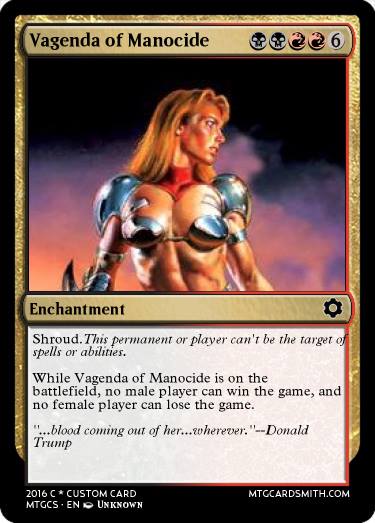[Editor’s note: This post appeared Monday on the blog Vaulting and Vellum]
Ahem. Everyone?
EVERYONE!
"Vagenda of Manocide."
[dead silence for 30 seconds followed by wild cheers] pic.twitter.com/FfrgPr06UL
— Matthew Foster (@OhWettestFarm) August 24, 2016
Sometimes, life gives you lemons, and you make lemonade. Similarly, on occasion, someone in the real world gives the internet something intended to cause offense, and it goes full Streisand Effect. The latest, most amusing one (for feminists like myself) is the peculiar case of the sign you see above, and the phrase “vagenda of manocide.”
But in addition to these things, the now ubiquitous phrase (vagendaofmanocide.com now redirects to the Clinton campaign’s fundraising page, for example) is also a prime example of some interesting linguistic moves, so I thought we’d have a lovely little teachable moment and explore just what “vagenda of manocide” could really mean.
To perform any proper linguistic analysis of a new term, I find it’s always best to start with etymology, and the Oxford English Dictionary and its etymological notes are a great place to start.
“Vagenda” seems to be a portmanteau composed from “vagina” and “agenda,” and “manocide” seems to be a clumsy neologism coined by taking the English “man” and appending the latinate “-cide” suffix along the same rules as homocide, fratricide, parricide, and so on. Both of these are worth exploring.
“Vagina,” a word for an integral part of the female mammalian reproductive system, derives from the Latin vagina for sheath or scabbard, coming into being as a kind of militaristic euphemism. Taken to its literal extremes, of course, this would make the male side of the equation a sword, and make sexual reproduction by necessity an act of violence. Furthermore, one wonders, if “vagina” is “sheath” what the function of underwear is. But these are perhaps both discussions for another time.
“Agenda” derives from the Latin gerundive agendus (-a, -um) from the verb agere, meaning “to do,” with the “ndus” ending signifying that a thing “ought to be” (which is why I’m such a fan of the name “Amanda,” which literally means “someone who ought to be loved,” but I digress). So literally, an “agenda” is a number of things that ought to be done.
While in its present form it appears to be trying to mean “an agenda held by possessors of vaginas” (and by this to mean “an agenda held by women”), this is not immediately obvious from the etymology. Although the Latin vagina is a noun, since there does not appear to be a Latin equivalent for the modern English verb “to sheath,” it does not seem too outlandish to suppose that if one were to want a Latinate word for “things that ought to be sheathed” one might well arrive at “vagenda.” Objects in this category would, of course, include the obvious bladed weapons — swords, daggers, and the like — but could also be extended by metaphor to the male genitalia and modern analogues.

“Manocide” is also interesting from an etymological standpoint. While the suffix “-cide,” from the Latin caedere (to cut or kill), seems fairly straightforward, its use is fairly consistently limited to latinate words: “fratricide” is the combination of the suffix with the Latin frater for “brother,” “matricide” is the same with the Latin mater for “mother,” “tyrannicide” with tyrannus for “tyrant,” and so on.
Indeed, the truly remarkable thing about “manocide” is that the word “homicide” already fulfills its intended meaning, being the combination of homo, hominis for “man” and “-cide.” This suggests that the likely reason for the coining of “manocide” is that “homicide” has come to mean the killing of all humans, and is not specific to the male gender that the Germanic “man” currently signifies in the modern English language. Thus “manocide” must mean the cutting or killing of “man.”
Herein lies a problem of interpretation that modern society has been grappling with: what constitutes a “man.” Modern gender theory has split the notions of sex and gender such that “male” now mostly refers to sex, while “man” refers to a socially-constructed idea of so-called “masculinity.” By choosing “man” rather than “homo” as the first part of the neologism, then, it may well be inferred that the target of “manocide” would be not males, or perhaps even the individuals, but the idea of a “man,” or socially-constructed masculinity itself. Literally, “manocide” would then be the cutting or killing of masculinity.
What, then, is this “vagenda of manocide” that the sign-writer indicates we ought to beware? A vagenda being one of any number of sheathable objects, and manocide being the act of killing masculinity, I believe the answer is clear:
Hillary Clinton has a magical sword that can cut through masculinity itself.
Or, taken less literally, Hillary Clinton’s campaign to be the first woman to serve as President of the United States is a metaphorical weapon which, if used correctly, could cut or even kill the patriarchy.
And that’s a vagenda I can get behind.
***
Thanks for reading! Except for the very *very* occasional tip (we take Venmo now!), I only get paid in my own (and your) enthusiasm, so please like This Week In Tomorrow on Facebook, follow me on Twitter @TWITomorrow, and tell your friends about the site!
If you like our posts and want to support our site, please share it with others, on Facebook, Twitter, Reddit — anywhere you think people might want to read what we’ve written. Thanks so much for reading, and have a great week.
***
Richard Ford Burley is a human, writer, and doctoral candidate at Boston College, as well as an editor at Ledger, the first academic journal devoted to Bitcoin and other cryptocurrencies. In his spare time he writes about science, skepticism, feminism, and futurism here at This Week In Tomorrow.

